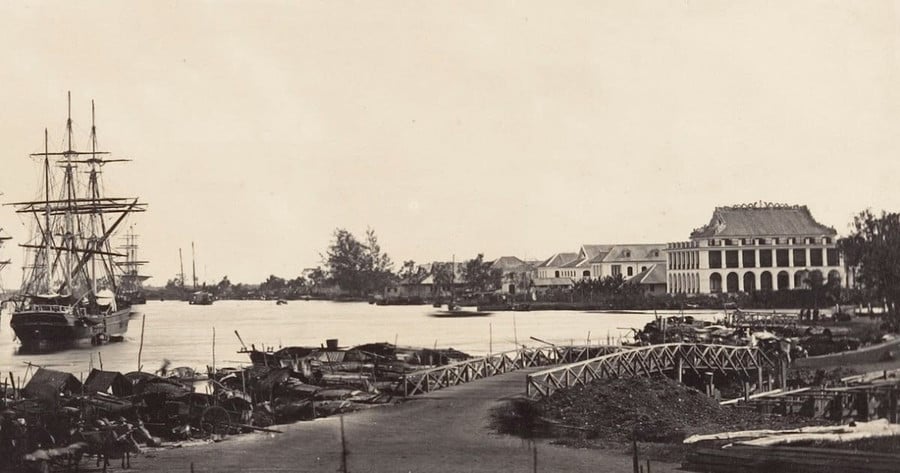And on June 5, 1911, aboard the ship Amiral Latouche Tréville from Nha Rong Port, Nguyen Tat Thanh decided to leave his beloved homeland to find a way to save the country.
Nha Rong Wharf in the early 20th century. From this place, on June 5, 1911, the patriotic young man Nguyen Tat Thanh left his homeland on the ship Admiral Latouche-Tréville to fulfill his ambition of liberating his country from the yoke of colonial and imperialist oppression. Photo: VNA archives.
Under the new name Van Ba, working as a kitchen assistant on the ship Amiral Latouche Tréville, Nguyen Tat Thanh set out as a laborer, starting from scratch. Throughout his 30-year journey searching for a way to save the country and liberate the nation, Nguyen Tat Thanh-Nguyen Ai Quoc crossed three oceans, four continents, thirty countries, and hundreds of cities, overcoming countless hardships and obstacles, and working many jobs to make a living, with the burning determination: "Freedom for my people, independence for my homeland."
Over those 30 years, countless stories about Uncle Ho and his revolutionary life have emerged. Today, whenever we reread or listen to them, we understand and love him even more, and are deeply grateful for his immense contributions to the great and glorious revolutionary cause of our Party and our people... "Flying far and high" is one of thousands of stories about Uncle Ho's revolutionary life.
The story goes that the great October Revolution had an extraordinary and captivating power. Upon hearing the news of the success of the Socialist Revolution, Uncle Ho immediately intended to go to Russia, even though he didn't fully understand the immense significance of the revolution at the time. Going to Russia back then was very difficult and dangerous. After the Red Army repelled the armies of 14 imperialist countries and suppressed the reactionaries within the country, Russia was then surrounded by imperialist powers.
There were people like the French poet Raymond Lophevor and his fellow workers who secretly risked their lives traveling to Russia, only to be shipwrecked and killed in the Baltic Sea on their return. Many others were captured and killed by international counter-revolutionaries near Russia. The dangers were not feared. But how to overcome the difficulties? First, how to cross the border from Paris (France) without being captured by French secret agents? How to get through Germany and Poland?
Having spent a lot of time with the workers, Uncle Ho knew they were very generous. For example: At a rally in Paris to raise funds for Russia, which was suffering from famine and disease, the speakers were Mrs. Sovorin, Comrade Casanh, and Comrade Kutury. When they heard about the fundraising, everyone, as one, emptied their pockets and donated everything they had, without counting how much or how little they had donated. That was a very noble expression of international proletarian solidarity!
An old worker named N., who worked at the power plant, often accompanied Uncle Ho to rallies. One day, as they were returning from a meeting, Comrade N. whispered to Uncle Ho: "My friend! I've worked my whole life and saved a little money. I have no wife or children, so when I 'close my eyes for good,' I'll leave that money to help you with your revolution."
Now, if he wanted to go to Russia, there was only one way: to ask the workers for help. Having made up his mind, Uncle Ho sought out and befriended the railway workers. After many days of searching and investigating, he met Comrade X., who worked on the locomotive of the Paris-Berlin train. Hearing that Uncle Ho wanted to go to Russia, Comrade X. readily offered his help. Comrade X. said: “Okay, we’ll hide you in a place on the train where even the secret police won’t find you! But our train only goes as far as Berlin.” After a moment of thought, Comrade X. added: “No problem! I’ll discuss it with the German railway workers to help you.”
So, the first step was successful. But many difficulties remained. How to shake off the spies who followed me day and night like a shadow? The German workers might be able to help, but would the Polish workers be willing to help? And who would be in charge of the Paris newspaper? My comrades from Asia and Africa could contribute articles or money, but I needed someone without a family, as busy as myself, to handle everything: collecting money, urging people to submit articles, secretly sending newspapers to the colonies, selling newspapers for propaganda purposes right in Paris... It was a whirlwind of worries!
For months, the plan remained unfinished when one day Uncle Ho was summoned by the Central Committee of the French Communist Party and told: "Comrade, you will attend the Fifth Congress of the Communist International as a representative of colonial peoples." This good news made Uncle Ho overjoyed! The secret police knew Uncle Ho's routine perfectly. He went to work in the morning, to the library in the afternoon, to rallies in the evening, and to sleep at night. Uncle Ho also knew their routine perfectly: They only followed him from his lodging to his workplace, to his reading place, and to his meetings. Afterwards, certain that Uncle Ho wouldn't go anywhere, they returned to their homes to enjoy their family life.
That day, with his hands in his pockets, Uncle Ho calmly boarded a bus to attend a rally in the suburbs of Paris. About half an hour later, he quietly walked around the train station. A trusted comrade was waiting there and handed him a first-class train ticket (because first class was only for wealthy passengers, less likely to be suspected) and a small suitcase... Uncle Ho tried to remain calm, but only when the train crossed the Franco-German border did his heart stop pounding. He was certain that the secret agents guarding him would be severely punished by the colonial minister! And the minister himself was furious. Passing through German territory occupied by the French, he witnessed the same colonial scenes. To the Germans, the French militarists here were just as arrogant and domineering, just like the French in our country... Several wounded French soldiers mistakenly boarded the first-class carriage and were immediately chased off by a French officer with a cane...
Even six years after the war, famine was still rampant in Berlin (and probably in other places as well). Everyone looked pale and sickly. The inflation of banknotes was terrible; the price was different in the morning than in the afternoon. If you tried to buy a newspaper with banknotes, the stacks of banknotes would be larger than the newspaper itself! Uncle Ho's entire fortune was only a little under 1,000 francs, yet in German currency, he had become a millionaire...
President Ho Chi Minh was the beloved leader of the Vietnamese working class and nation, an outstanding cultural figure, and a brilliant fighter of the international communist and workers' movement. His entire life and career served as a shining example for the entire Party and people to follow. "Fleeing far and high" is one of the stories told about Uncle Ho's time abroad. Through this, we see that, despite difficulties, hardships, and being surrounded, monitored, and stalked by secret agents, Uncle Ho, with unwavering determination, found ways to overcome them and flee far and high, reaching the cradle of the Russian October Revolution and Lenin to find a way to save the country.
----------------------
(*) According to "Telling Stories While Walking" by T. Lan, National Political Publishing House - Truth, 2015.
Source: https://baogialai.com.vn/xa-chay-cao-bay-post326545.html




![[Photo] People's Public Security forces deployed to protect the 14th National Congress of the Party](/_next/image?url=https%3A%2F%2Fvphoto.vietnam.vn%2Fthumb%2F1200x675%2Fvietnam%2Fresource%2FIMAGE%2F2026%2F01%2F10%2F1768034712186_ra-quan-bvdhd-bca-39-8977-jpg.webp&w=3840&q=75)
















































![[Infographics] Resolution No. 79-NQ/TW of the Politburo on the development of the state-owned economy](https://vphoto.vietnam.vn/thumb/402x226/vietnam/resource/IMAGE/2026/01/10/1768038914679_chp_3-11-23.jpeg)













































Comment (0)